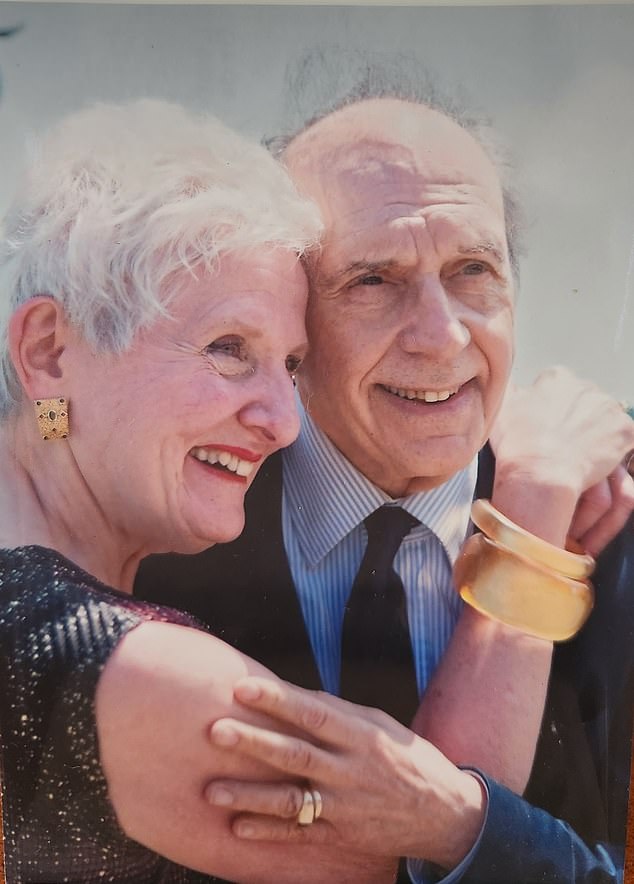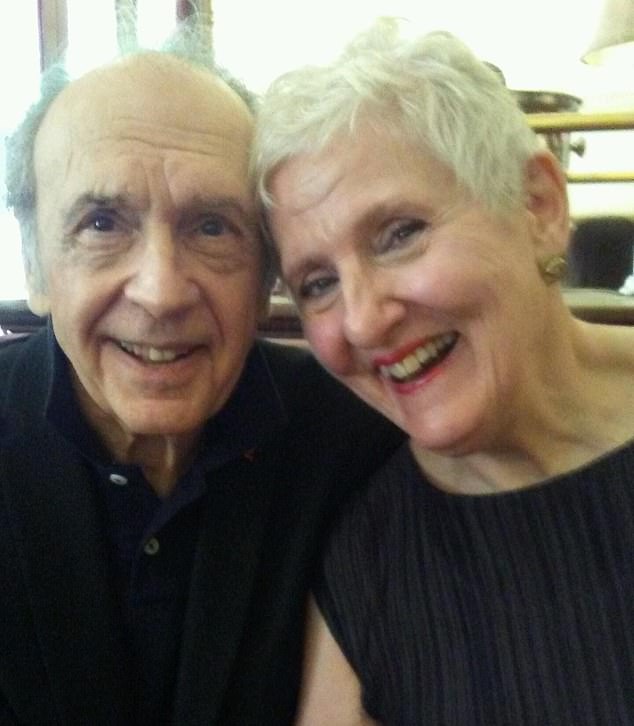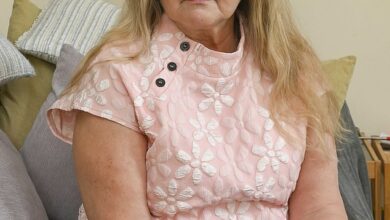I Watched My Husband and Soulmate of 37 Years Lose Himself to the Same Dementia as Robin Williams – These Are the Signs I Missed





Looking back, Mary Lou Falcone now recognizes the warning signs of the devastating dementia her husband would later develop.
Her concern began in 2016, when her husband, artist Nicky Zann, had trouble finding one of his favorite restaurants just a few blocks from his hotel in Vienna.
He became increasingly tired, paranoid and unsteady on his feet. She attributed it to working too hard.
But then the hallucinations began. A visit to specialists would confirm the unimaginable. Nicky was diagnosed with Lewy body dementia, the same disease that actor Robin Williams was diagnosed with post mortem.
Although Lewy body dementia falls under the same umbrella as Alzheimer’s disease, it does not destroy memory in its early stages. Instead, it causes attention problems, hallucinations, movement problems, and sleep disturbances.
Nicky suffered from hallucinations and memory loss, and eventually was unable to eat or walk on his own. He died just a year after being diagnosed.

Nicky Zann, right, was diagnosed with Lewy body dementia in 2019 and died the following year
Lewy body dementia (LBD) progresses more rapidly than Alzheimer’s disease and causes steady but gradual mental decline.
In the early stages, problem-solving and decision-making skills are the first to decline. Most people with LBD also experience changes in their sleep patterns, with difficulty falling asleep and staying asleep, as well as vivid dreams and nightmares.
LBD also includes aspects of early-stage Parkinson’s disease, such as tremors, muscle stiffness, and balance problems. Memory problems usually begin later, and LBD patients will have good and bad days with fluctuating levels of mental clarity.
Mary Lou from New York told DailyMail.com that, looking back, she recognises a number of warning signs that preceded Nicky’s forgetful episode in Vienna.
She said: ‘I saw Nikki getting very tired. I saw him getting slightly paranoid. But sometimes that happens. It wasn’t normal for him, but you say, well, maybe he has reason to feel that way.
‘TWhen I saw Nicky spending 20 minutes writing one check, I started to get more and more concerned.’
But his symptoms quickly worsened after he underwent major heart surgery in 2017.

The couple got married about three years ago, although they have been together for almost four decades. Their wedding photo can be seen here
When they returned from Vienna, Mary Lou and Nicky learned that he had suffered a heart attack abroad and needed major surgery.
Mary Lou believes Nicky changed forever when he woke up from the anesthesia.
She said, “Then the hallucinations started.
“It’s pretty normal to have hallucinations after anesthesia. But what I didn’t realize until much, much later was that these hallucinations never went away.”
Sometimes he heard voices coming from the faucet or music from pillows. The hallucinations turned to squirrels running under their bed. Other times he saw children running around their apartment.
And instead of Nicky gradually recovering and becoming stronger after his heart surgery, he continued to lose weight, was more tired than ever and lost his balance more and more often.
The first neurologist they saw in the fall of 2018 did an MRI to rule out other possible causes of his symptoms, including a stroke or a tumor. The doctor found nothing wrong with him, but he referred them to a specialist in another hospital system.
In late February 2019, the specialist performed an MRI-like scan, the so-called dopamine active transporter scan (DaT), which showed that Nicky had LBD.
Mary Lou said, “The doctor said definitively, this is Lewy body dementia (LBD) with Parkinson’s aspect. I was stunned.”
Nicky was officially diagnosed on March 1, 2019, at the age of 75.

MaryLou believes the anesthesia during his heart surgery caused severe hallucinations of squirrels and children running around their apartment
Ms. Falcone, a leading classical music publicist who has shaped the careers of young musicians and conductors in her 50-year career, never expected this.
An estimated 1.4 million Americans have LBD. Diagnosing it can be difficult because the symptoms mimic those of Alzheimer’s, Parkinson’s, schizophrenia and other psychiatric conditions.
LBD destroys the brain faster than Alzheimer’s, which people can live with for about eight to 10 years after diagnosis. However, people diagnosed with LBD generally live for another five to seven years.
Like Alzheimer’s, LBD has no cure. There are medications to manage the symptoms.
One of these is a drug that was developed to treat Alzheimer’s. It blocks an enzyme that blocks a neurotransmitter that plays an important role in memory and cognition, acetylcholine.
By preventing this enzyme from breaking down the neurotransmitter, communication between brain cells responsible for memory, thinking, and general cognitive functions improves.
There are also medications that aim to treat the movement symptoms that resemble those of Parkinson’s disease, while other medications, such as antipsychotics, can treat the vivid hallucinations.
After his diagnosis, Nicky underwent a dramatic transformation.
He has long been regarded as one of the most prolific and innovative illustrators and cartoonists. His work has been shown in exhibitions around the world and has appeared in issues of Newsweek, Esquire and Fortune. It has even graced the cover of The New Yorker.
But he was plagued by tremors that disrupted his painting and his ability to play music. He became increasingly paranoid and lost his ability to walk on his own.
However, there were periods of brightness alternating with darkness. Fluctuations in brightness are common in LBD.
Sometimes Nicky could make music as if nothing had changed and he could paint.
MaryLou said, ‘As a teenager he was a real rocker, and he always was.
“So when he could barely walk — my office is across the street from our apartment — I heard the piano crying. He was actually playing it. That sensory memory was still there.”

Mary Lou and Nicky are pictured in 1983, the year they became a couple
She did what she could to care for Nicky herself and tried to give him as much independence as possible.
She said: ‘It took Nicky two to three hours to bathe, put his clothes on, button his shirt, all that. Of course I would look around the corner and check how it was going.
“He didn’t know I was watching him, but I was. And as long as he could do it without frustration, I just let it happen.”
She felt he “deserved the dignity, the feeling that I could do something for myself, that I was in control, because no one wants to have their control taken away.”
The couple managed well at home the year after Nicky was diagnosed. He went to classical music concerts with Mary Lou, but they no longer traveled.
They met friends in town for dinner or tea, and they spent time with Nicky, giving Mary Lou some time to herself every now and then.
In the spring of 2020, just as the world was entering the Covid pandemic, Nicky’s condition had deteriorated and according to MaryLou, “things were going downhill fast.”
A week before his death, he stopped eating. Then he stopped drinking. He became increasingly weak as the disease attacked the part of his nervous system responsible for regulating his heartbeat and maintaining blood pressure.
MaryLou said he “left peacefully” on July 15, 2020.
“About two months before he died, he wrote this poem about what it felt like to descend into the Lewy body, what it felt like to be trapped,” she said.
‘I didn’t find this poem until three months after he passed away. When I found it, I just sat there and cried, because no one describes it better than Nicky.’




